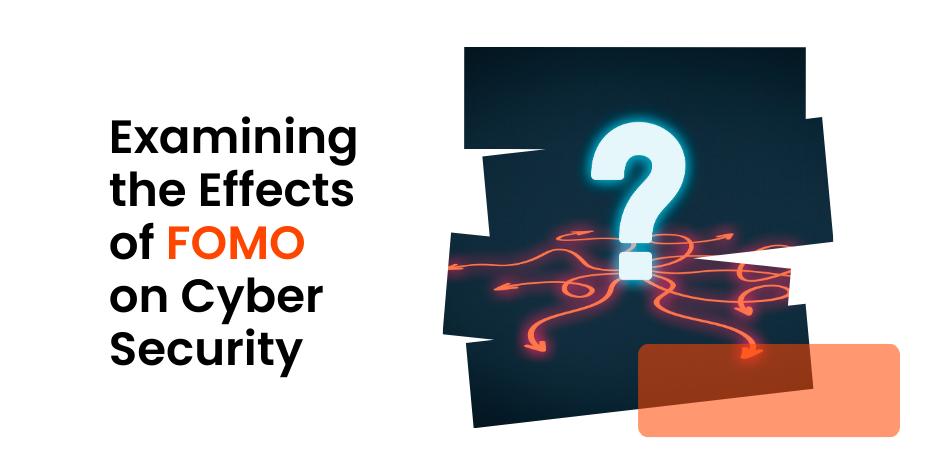Examining the Effects of FOMO on Cyber Security

Stay Informed With Our Weekly Newsletter
Receive crucial updates on the ever-evolving landscape of technology and innovation.
FOMO, or Fear of Missing Out, is a pervasive phenomenon in today’s hyper-connected world. It refers to the constant anxiety individuals feel when they perceive that others are experiencing more interesting, enjoyable, or fulfilling experiences than they are.
We delve into the effects of FOMO on cyber security, exploring how this psychological state can impact online behaviour and contribute to cyber attacks.
By understanding the intersection of FOMO and cyber security, we can develop strategies to mitigate its effects and prepare for the future.
Understanding FOMO: A brief overview

FOMO is the fear or apprehension of missing out on rewarding experiences that others may be having. This state of mind stems from the fear of being excluded or left behind in an ever-connected world.
As social media platforms and online interactions become ingrained in our daily lives, FOMO has emerged as a powerful and sometimes detrimental force.
The intersection of FOMO on cyber security

The effects of FOMO are not confined to personal feelings of inadequacy and anxiety. This phenomenon also intersects with cyber security, presenting potential risks and vulnerabilities.
How FOMO influences online behaviour
FOMO can significantly impact individuals’ decision-making processes when engaging with online platforms. The heightened desire to be a part of the “in crowd” or to experience what others are experiencing can lead to impulsive and risky behaviours.
They may be more inclined to disclose sensitive data, such as passwords or financial details, to gain social validation or access exclusive online communities. This behaviour increases the risk of falling victim to cyber attacks.
Real-world examples of FOMO-driven cyber attacks
Case study 1
In a recent case study, a large social media platform experienced a FOMO-driven cyber attack. Cybercriminals created a fictitious event promising exclusive access to an upcoming concert.
Users, driven by the fear of missing out, click the accompanying link, unknowingly downloading malware onto their devices. This attack not only compromised the user’s personal information but also served as a gateway for further cyber attacks on their networks.
Case study 2
Another notable example involved a phishing campaign exploiting FOMO during a limited-time online shopping event. Cybercriminals sent out fake promotional emails enticing recipients with exclusive discounts and offers, preying on individuals’ desire to be a part of the event.
By clicking on the malicious links within the emails, users inadvertently provided cybercriminals with access to their personal and financial information.
Mitigating the effects of FOMO on cyber security

Strategies for individuals
To mitigate the effects of FOMO on cyber security, individuals must cultivate a security-conscious mindset and adopt proactive measures:
- Be cautious of clicking on unfamiliar links, even if they appear enticing or promise exclusive opportunities.
- Regularly review and update privacy and security settings on social media platforms to restrict unnecessary access to personal information.
- Exercise scepticism when encountering unsolicited requests for personal or financial information, especially from unknown sources.
- Stay informed about the latest cyber security threats and scams to better recognise and avoid potential risks stemming from FOMO-based attacks.
- Develop healthy online habits, such as limiting time spent on social media and focusing on meaningful offline experiences.
Strategies for businesses
In addition to individual efforts, businesses must also take proactive steps to address the risks posed by FOMO-driven cyber attacks:
- Implement robust security systems and protocols to detect and prevent phishing attacks, malware infiltration, and other cyber threats.
- Develop comprehensive employee training programs that educate staff about the risks associated with FOMO and provide guidelines for secure online behaviour.
- Monitor social media platforms and online communities for potential scams or malicious activities that exploit FOMO.
- Regularly update and patch systems and software to ensure optimal protection against emerging cyber threats.
- Collaborate with industry partners and share best practices to stay ahead of evolving FOMO-driven cyber attacks.
The future of FOMO on cyber security

Predicted trends
As technology continues to advance and the digital landscape evolves, predicted trends indicate that FOMO will be leveraged in increasingly sophisticated ways. Cybercriminals will continue to exploit individuals’ desires for social validation and experiences, utilising targeted and persuasive tactics to compromise cyber security defences.
Preparing for the future
To prepare for the future effects of FOMO on cyber security, organisations and individuals must embrace a multi-faceted approach:
- Invest in advanced cyber security technologies and solutions that can detect and respond to evolving FOMO-driven cyber threats.
- Continuously educate and train individuals about the risks of FOMO and how to identify and respond to potential cyber attacks.
- Encourage the development of strong digital literacy skills to empower individuals to make informed decisions regarding online behaviour.
- Promote a culture of cyber security awareness and accountability within organisations, ensuring that all stakeholders understand the potential risks associated with FOMO.
- Collaborate with cyber security experts, researchers, and government agencies to develop robust frameworks and policies that address the intersection of FOMO and cyber security.
Conclusion
The effects of FOMO on cyber security are extensive and multifaceted. By understanding the psychological underpinnings of FOMO, its intersection with cyber security, and real-world examples of FOMO-driven cyber attacks, we can take active steps to mitigate its potential risks.
Dive deeper into the world of cyber security and understand phenomena like FOMO’s impact on our digital safety. Take one of our specialised programs at the Institute of Data and equip yourself with the knowledge and skills needed for the digital age.
We also offer free career consultations with our local team if you’d like to discuss your options.

